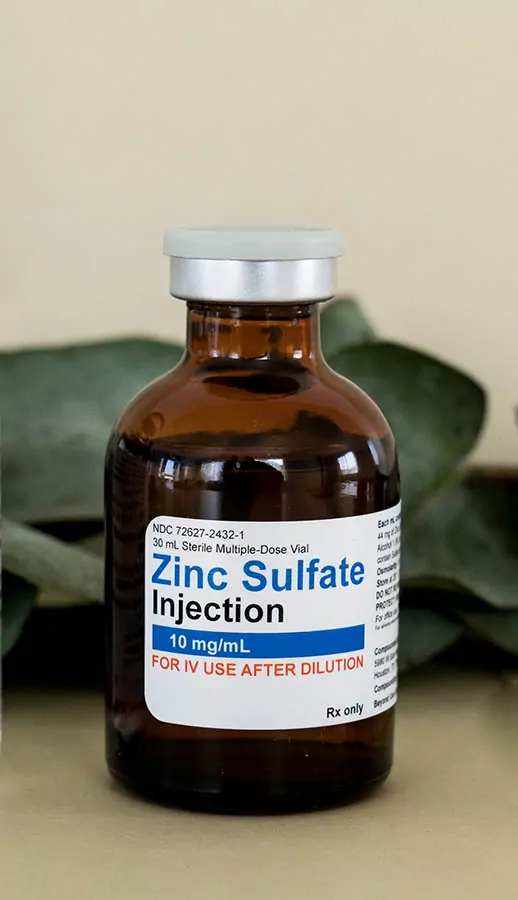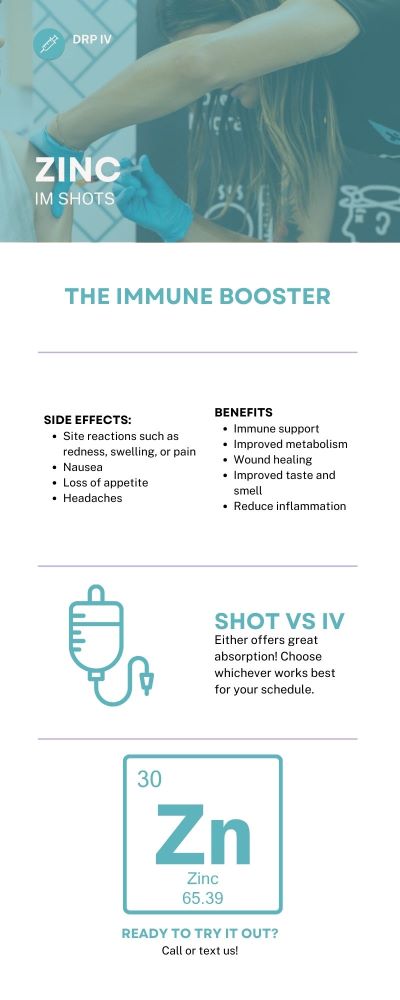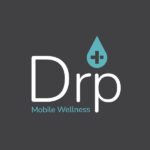In this installment of the IM shot series, we’ll dive deep into one of the methods of supplementing zinc: the zinc shot. Zinc can be sourced from a diet of meat and fish, oral tablets, juice shots, or an intramuscular shot. Zinc is so important, especially during periods of growth. If you’re in need of some extra zinc, this article is for you.

When you think of a zinc shot, the first thing that comes to mind may be a zinc juice shot, or maybe you just think of the naturally occurring mineral. At Drp IV, we offer zinc shots as intramuscular injections. So what is zinc?
Zinc is a naturally occurring element that is found abundantly in meat, fish, and animal products. Legumes and whole grains are also high in zinc. In modern times breakfast cereal is also fortified with zinc, providing an additional resource for those who are vegetarian or don’t eat meat. These individuals often suffer from zinc deficiencies.
If someone has a zinc deficiency they’ll notice changes in their skin, bones, immune system, nervous system, and digestive system. This can look like alopecia, delayed growth, getting sick often, birth defects, and changes to taste and smell.
The risks of zinc deficiency are serious and can have a big impact on the quality of someone’s life. A deficiency can be diagnosed by meeting with your medical provider who will likely order a blood test. If you have a deficiency, there are multiple options for supplementing zinc, like an intramuscular zinc shot.
Zinc is so essential to good health because of how integrated it is in important bodily functions. Most of the zinc in the body is stored in bone and skeletal muscle but it’s used throughout the body to do the following:
There are other reasons individuals choose to take a zinc shot. Some of these aren’t founded in medical research but they may be the reality for some. For some zinc is used to help with:
While having enough zinc is crucial, getting too much can also lead to negative side effects. It’s not likely that someone can get excessive zinc from eating foods with zinc, however, overdoing supplements can be the cause of negative side effects. Here are a few of those:

Taking zinc supplements like a zinc shot may lead to an improvement in overall well-being, especially if you were deficient in zinc. It plays a crucial role in immune function, wound healing, and other physiological processes, contributing to a sense of improved health.
The onset of zinc’s effects depends on a few different factors, including the form of zinc (whether it’s a zinc shot or not), the presence of food in the stomach, and individual characteristics. Generally, noticeable improvements may be observed within a few days to a couple of weeks, particularly for issues related to immune function or wound healing.
While zinc is an essential mineral, taking it in excess on a daily basis can lead to adverse effects, including nausea, vomiting, and immune system suppression. It is crucial to adhere to recommended daily allowances and consult with a healthcare professional before long-term daily supplementation.
Calcium, copper, and iron supplements should be spaced apart from zinc supplementation, as they can interfere with its absorption. Additionally, certain medications, like antibiotics and diuretics, may interact negatively with zinc, and it’s advisable to consult a healthcare professional before combining them.

Drip Admin has written several informative articles and guides on the benefits of IV therapy, emphasizing the science behind the practice. Our writing style is engaging, concise, and accessible, making complex medical concepts easily understandable for readers.